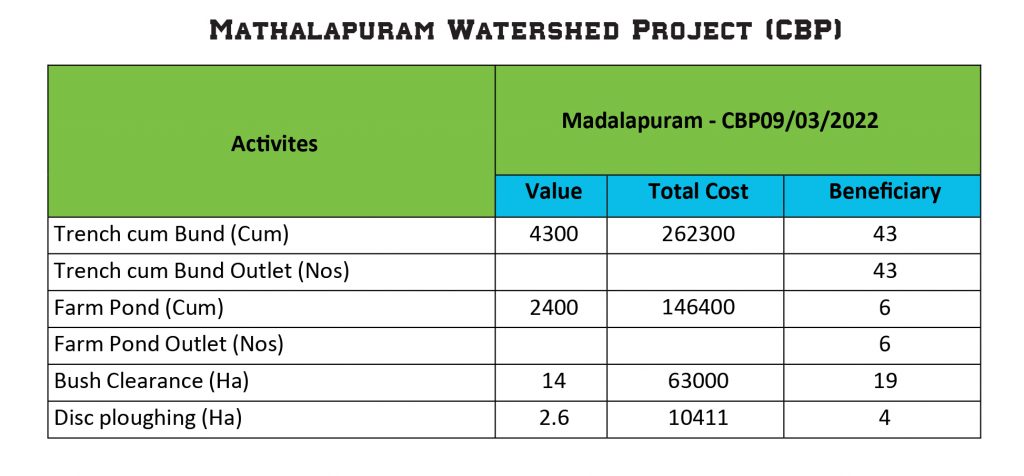
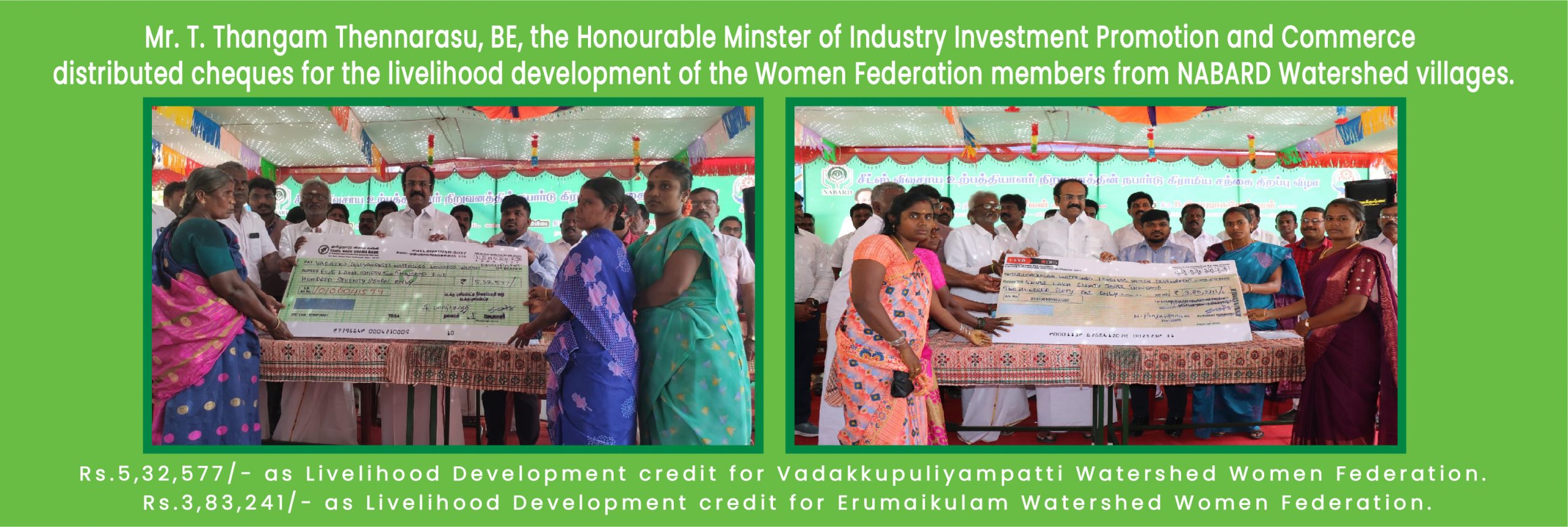


WATERSHED DEVELOPMENT
Watershed management intercessions like soil and water conservation and water harvesting are vital in enhancing the expected strength of an area. So, there will be an upsurge in total biomass, production, reaping rate of crops, irrigation types, livestock, income generating opportune etc., Watershed management know-hows have been recognized to be operative in curtailing soil erosion through water overflow / run-off and allowing the water to permeate consequently, improving the terrestrial texture. This also recharges the groundwater, augmenting the surface water obtainability and enhances the agrarian productivity. SEEDS effective watershed team achieves the appropriate implementation, socio-economic and organizational mechanisms of the watershed to create a sustainable source of revenue for the in-need people. Watershed management is a complete process, which attempts to realize the superlative conceivable stability in the environment between natural possessions, human beings and other existing creatures in the nature. SEEDS smear a diversified method, using methodical acquaintance and policies with sustainable development practices from various sources to generate extreme assistance to the farming community.
WATERSHED DEVELOPMENT TEAM

J. S. Balaji
Manager NRM

P. Sivakumar
Project Coordinator

P. Nivas
Project Coordinator
Project Manager

P. Arumugam
Project Manager

T. Deepak Raja
Project Manager

A.Rajaneethi
Project Manager
Agronomist

M. Balamurugan
Project Manager

R. Mariselvam
Project Manager

A.Rajaneethi
Project Manager
Civil Engineer

M. Karthick
Project Manager

A.Rajaneethi
Project Manager

A.Rajaneethi
Project Manager
Social Worker

U. Gandhi
Project Manager

M. Panchavarnam
Project Manager

A.Rajaneethi
Project Manager
ACCOUNTS

S. Gurubaskaran Accountant
Project Manager

R. Dhanam
Accounts Assistant
Project Manager

A.Rajaneethi
Project Manager
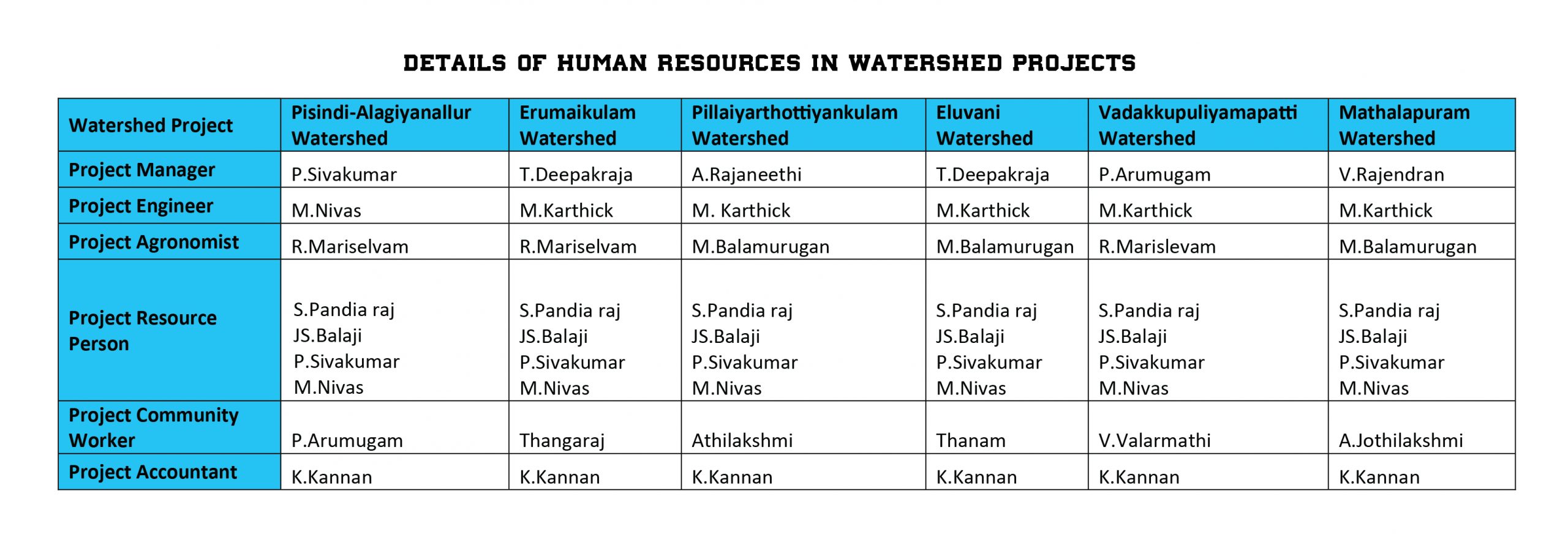
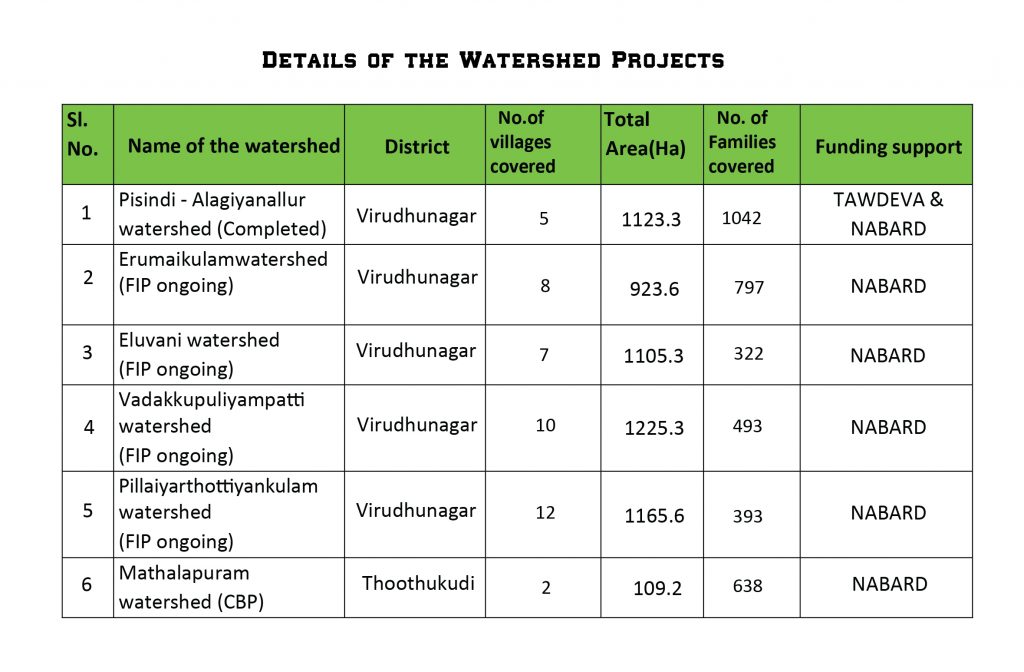
Pisindi – Alagiyanallur Watershed and Climate Proofing Project
Recognizing the exertions by SEEDS in development of the status of the farming community and rural development, NABARD came forward in sanctioning this watershed project in Virudhunagar District. Subsequent to the monitoring of the implementation works of the CBP, the Full implementation phase was sanctioned during the year 2015 sponsored by TAWDEVA & NABARD 50% respectively and the climate proofing project was comprehended and sanctioned in March 2017. The FIP was efficaciously accomplishedby the end of July 2021. The total grant sanctioned for the implementation of soil and water conservation activities was Rs. 1,16,54,150/- and Rs. 49,97,000/- was sanctioned for the climate proofing project implementation. The activities implemented through the climate proofing project is furnished below.
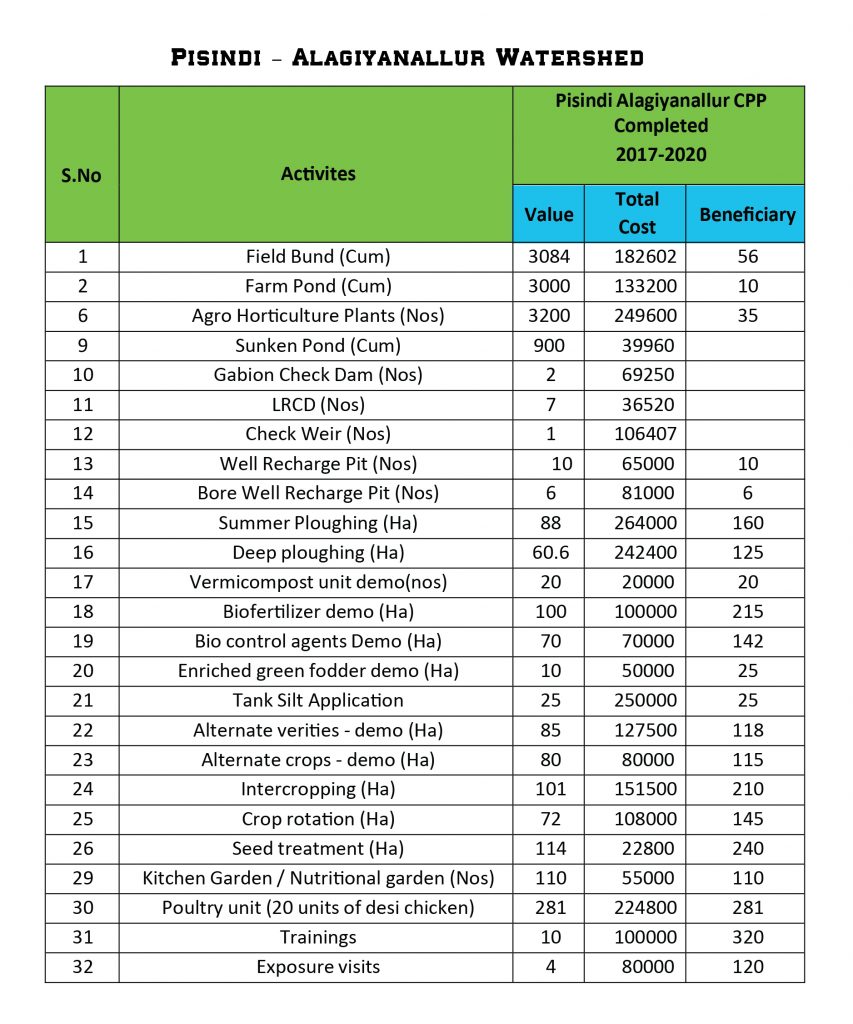
Impacts / outreach of the project
Impacts on the land and agriculture development activities had significantly improved through the soil and water conservation measures implemented by the VWC with the participation of the community, thereby augmenting the groundwater level in the watershed villages, which had caused various amendments in the land use pattern as well as the livelihood status farming community likefallow lands converted into cultivable land, enhancing the cultivable area, productivity enhancement, crop diversification and technically backed up package of practices reflected in the socio-economic status of the communities. The People who have migrated to towns in search of employment opportunities deserting agricultural activities, have returned back to their village with ensured employment opportunities.
Women in the watershed villages have established their skills and capacity and empowered their social and economic status by sustaining their livelihood, SHG concept and income generation activities through credit linkages from the banks. The habit of savings and internal credit generationamong the women had curtailed the habit of borrowing money from local money lenders to a greatextent. Economic independence among women had developed considerably through sustained functioning of SHGs. Gender equity awareness had augmented their capability in identifying the issues rising due to gender disparities. The trainings organized had empowered the women towards various initiatives for enhancing their livelihood status through their entrepreneurial events availing financial assistance through revolving funds, banks and thus enhancing their economic status. Furthermore, the women prior to project intervention wriggled to accomplish the household needs in fetching water from distant places, collecting fire wood, fodder for the cattle. The post project situation reveals the reduction in drudgery through convenience to water from the bore wells, fodder and fuel from agricultural lands. This situation had negotiated the women towards income generation through Dairy, petty shops petty trades. Women have empowered themselves to prove their capability in local government administration by contesting in Panchayat elections. Educational level of the children had up surged, as the parents got aware about the importance of education.
With the ensured employment opportunities to the community, the Schools in the watershed villages have been upgraded with additional infrastructure facilities on their own effort. Life standards of the people had been enhanced with the development in construction of concrete habitats, two wheelers for their mobility and other essentialities.
Through imprint molded by the implementation of Psindi – Alagiyanallur watershed project, NABARD was enthralled to sanction four more watershed projects to be implemented through SEEDS.
The CBP of these four watershed projects were completed successfully by the end of 2021.
In our targeted villages Soil erosions were controlled, and the Water velocity has reduced. Due to the fall of agriculture in this area many have started migrated to urban areas in search of job after the watershed agriculture has boom again which reduces this migration. Underground water level has increased. The major achievement is we have converted the Uncultivable lands into cultivatable and the cultivation level in these areas were increased. We have also bring back the traditional agricultural practices in our targeted areas which is also the major achievement of the watershed project.
Impacts of Watershed
Watershed has controlled the soil erosion in the targeted community
Water Velocity has reduced in our beneficiaries villages
The great success of the project is we bring back the Traditional agricultural practices in the community
Ground Water level had increased due to this watershed
We created awareness about Water Management among the beneficiaries through which we were able to save more water
We have changed the uncultivable lands into cultivable one and now cultivation land in the community has increased
We have converted the Rain fed area into agricultural land
Quantity and Quality of Yielding has increased in our targeted village
We made afforestation in our villages
Before the Watershed there was a lot of Migration in our targeted villages, now the migrant numbers have been reduced
Watershed is the base for initiating FPO’s. Based on the confidence we gained from the watershed project our sponsors supported us to initiate the FPO’s
We gained good support from the community through Sramadhan
We supported our beneficiaries through many convergence and credit linkages to improve our livelihood
Erumaikulam Watershed Project (CBP)
The major interventions in this project during the CBP were creation of water harvesting structures and expansion of the cultivable area in the watershed. The project activities include clearance of channels, excavation of farm ponds, Trench cum bunds, supply channel clearance, construction of well recharge pits, expansion of cultivable area through bush clearance activity, enhancing soil texture through disc ploughing, Agro-forestry and Agro-horticulture plantations and introducing dry land horticulture.
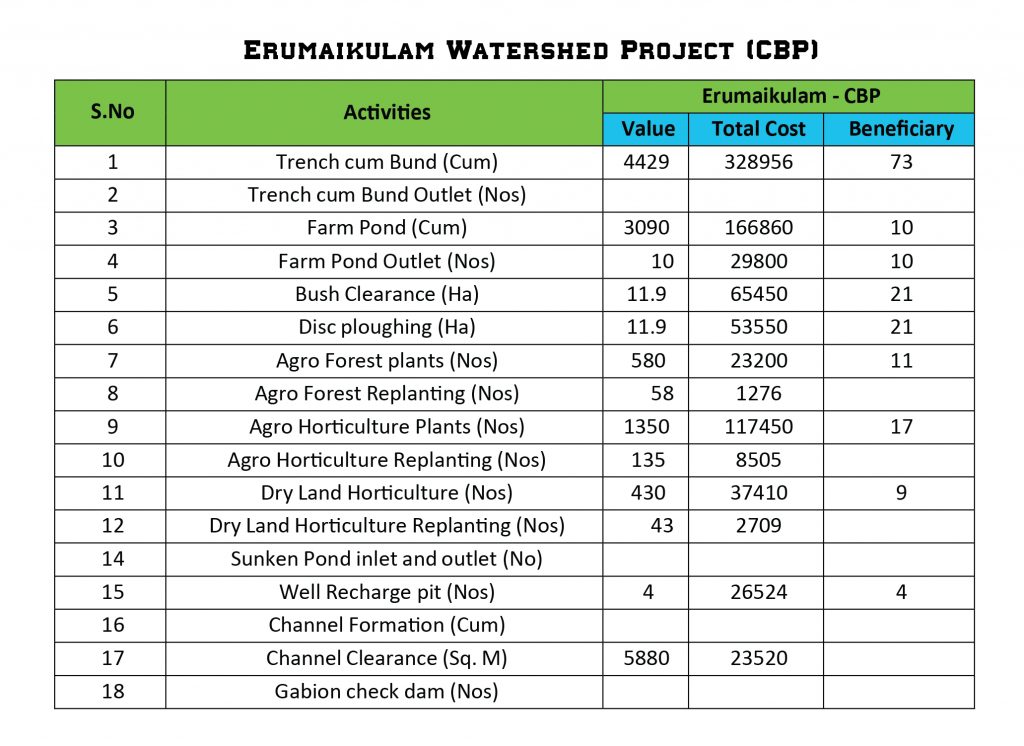
Impacts / outreach of the project
- The Project is implemented across 5 villages benefitting 815 households with 3016 members.
- 12 SHGs with 220 members were trained and got benefitted from Income generating.
- Village Watershed Committee was formed with 14 members.
- 1683 hectares covered under various land and water interventions.
- 40 Hectares of fallow land brought under cultivation due to availability and increase in groundwater resources.
- 1350 Agro Horticulture saplings and 580 Agro-forestry seedlings were planted in the watershed. In order to provide a more sustained income for the farmers in the region.
- 32 hectares of barren land inundated with bushes was converted into cultivable land.
- Increase in ground water table to 2 meters due to various water conservation measures.
- Significant increase in yield of crops ranging from 20 % to 30 % and improved increase in crop cycles, due to water availability and improved farm management practices has been witnessed in the watershed area.
Eluvani Watershed Project (CBP)
The purpose of this program was Integration of watershed development program activities towards rehabilitation of degraded Soils and building climate resilience by improving adaptive capacities of the communities against changing climate. The soil and water conservation measures focused were Trench cum bunds, excavation of Farm ponds and sunken ponds, Disc ploughing to enhance the soil texture and Agro-horticulture and Agro-forestry plantation.

Impacts / outreach of the project
- The project is implemented across 7 villages with 322 households and 966
- 160 women from 8 SHGs were benefitted from various training and income generating program for livelihood enhancement.
- Village watershed Committee formed with 16 members supported for development initiatives.
- 103 hectares covered under project interventions benefitting 322 households under various land and water interventions.
- 160 women benefitted from Income Generating Loan for development of Livelihood.
- Agro horticulture saplings and 380 agro forestry seedlings were distributed to the farmers in the watershed to provide a sustainable alternative livelihood for farmers and under Greening initiatives.
- 27 hectares of barren land inundated with bushes were converted to cultivable land.
Vadakkupuliyampatti Watershed Project (CBP)
NABARD’s support has helped to augment the water resources de-silting and deepening, creation of effective water ways and channelizing them through construction of suitable water harvesting structures in order to support the people. Thus, SEEDS has been able to effectively address this water crisis using a “Catalytic Strategy” to enhance the productivity and profitability of the farming systems and livelihood security in this watershed villages.
Major interventions:
Excavation of Farm ponds, Trench cum bunds, bush clearance, well recharge pits, supply channel cleaning and deepening, Agro-forestry & Agro-horticulture plantation, dry land horticulture, disc ploughing, deep ploughing and livelihood activities.
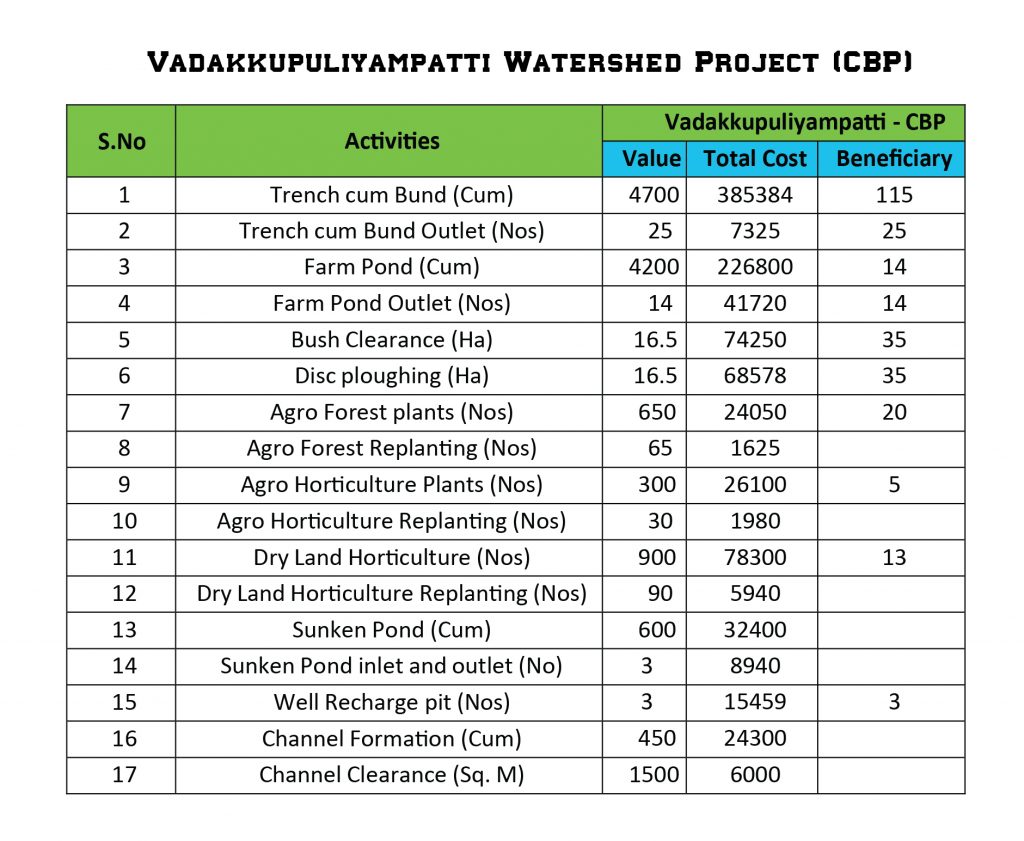
Impacts / outreach of the project
- The project is implemented across 8 villages with 493 households and 1479 members.
- 140 women from 7 SHGs were benefitted from various training and income generating program for livelihood.
- Village watershed Committee formed with 12 members supported for development.
- 106 hectares covered under project interventions benefitting 493 households under various land and water interventions.
- 140 women benefitted from Income Generating Loan for development of Livelihood.
- 1200 Agro horticulture saplings and 650 agro forestry seedlings were distributed to the farmers in the watershed to provide a sustainable alternative livelihood for farmers and under Greening initiatives.
- 18 hectares of barren land inundated with bushes were converted to cultivable land.
Pillaiyarthottiyankulam Watershed project (FIP)
The CBP of this watershed was concluded in December 2021. After the monitoring visit and constructiveremarks by the consultant and the DDM, NABARD authorized the FIP of this watershed in March 2022 with a grant approval of Rs. 2,27,87,220/- for implementation of area treatment activities for the preliminary two years which will be followed by the implementation of climate proofing project. Trench cum bunds were molded to an extent of 3150 cum for 62 beneficiaries at a cost of Rs. 343980. 4 Farm ponds were excavated to a tune of 1200 cum and 7 Ha of fallow was converted to cultivable land through the bush clearance activity benefitting 11 farmers. The implementation was slackened due to recent rain sand had resumed back recently.
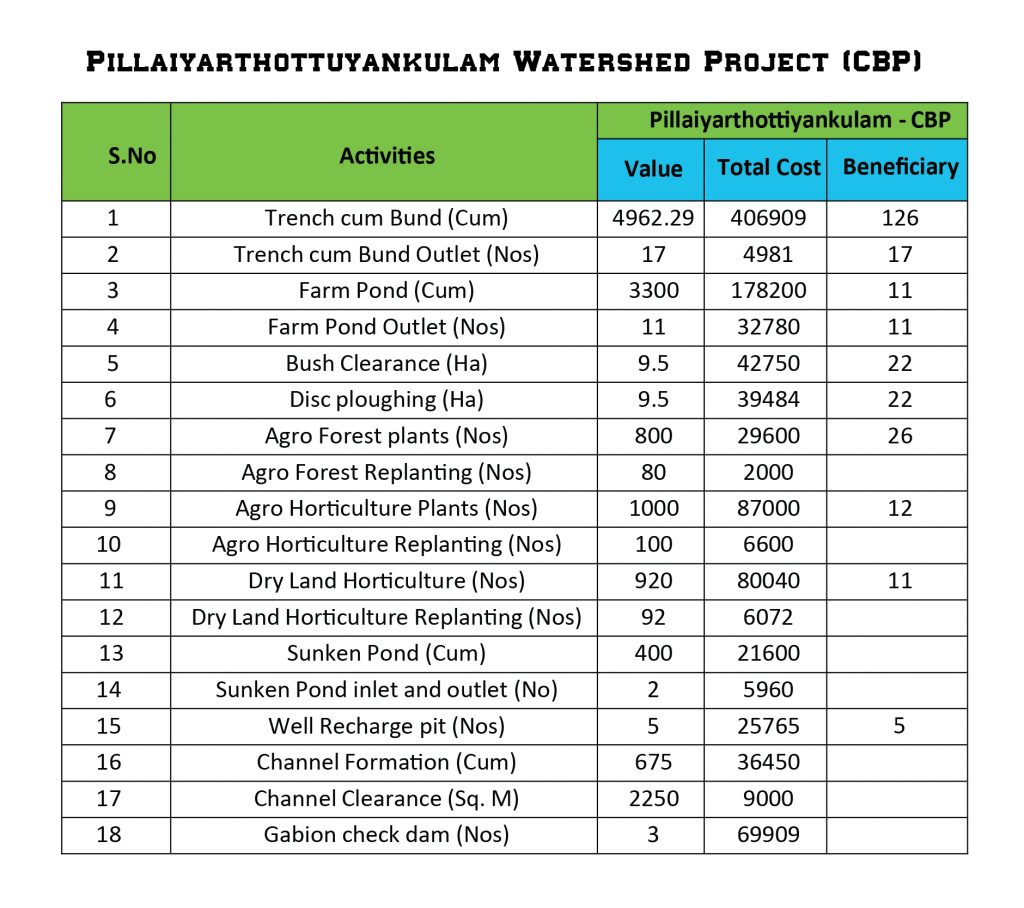
Impacts / outreach of the project
- The project is implemented across 7 villages with 364 households and 1092 members.
- 100 women being the members of 5 SHGs were benefitted from various training and income
generating program for livelihood enhancement. - Village watershed Committee formed with 16 members supported for development initiatives.
- 116 hectares covered under project interventions benefitting 364 households under various
land and water interventions. - 100 women benefitted from Income Generating Loan for development of Livelihood.
- 1000 Agro horticulture saplings and 800 agro forestry seedlings were distributed to the
farming community in the watershed to provide a sustainable alternative livelihood for
farmers and under Greening initiatives. - 11 hectares of barren land inundated with bushes were converted to cultivable land.
Mathalapuram Watershed Project (CBP):
Concurrently enthused by the ongoing successful project activities and the positive impact created by the project on the community and factual implementation of activities on field by SEEDS watershed team, NABARD came forward to sanction one more watershed project in Thuthukudi District in March 2022 and approved Rs. 15,56,150/- for implementing the Capacity Building Phase. Details of activities implemented till date are furnished below:
